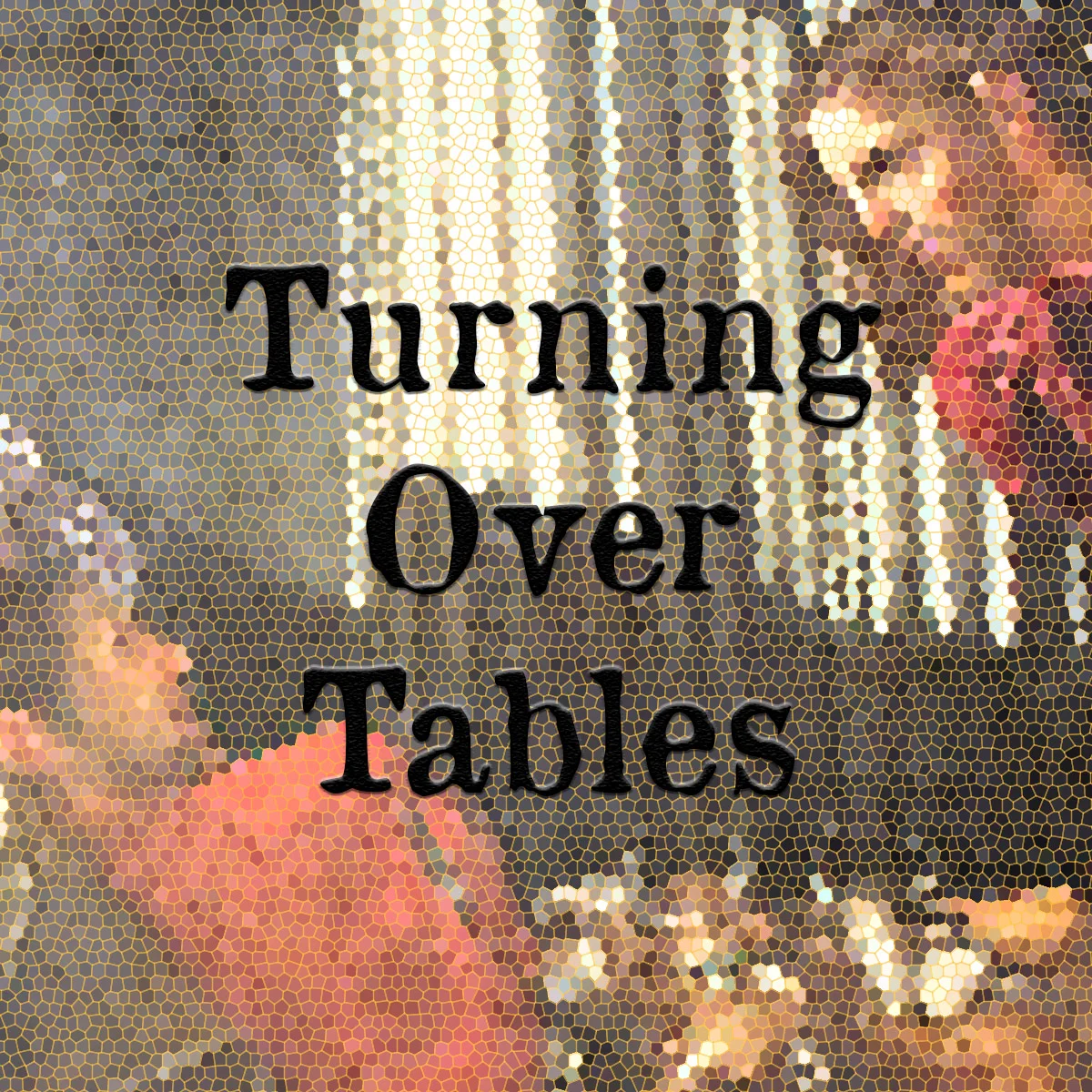Turning Over Tables (John 2:13-22)
The following is my manuscript for the sermon that I preached on Sunday, September 1 at The Bridge service. As always, this is not exactly what I said.
The cafeteria at R.P. Dawkins Middle School had a stage on one end. Unfortunately, its purpose was not to enliven our lunch period with musical dinner theater, but to make the room multi-functional for orchestra concerts, spelling bees, and for school administrators to make outlandish promises about high school to gullible 8th graders that high school could not keep. This raises a logistical problem. What are you going to do if a room is supposed to house dozens of cafeteria tables during the day but at night needs rows of chairs for a concert in which kids on the cusp of puberty sing Whitney Houston’s “Greatest Love of All”? Hypothetically.
Well, the fine folks at Rudolph Periwinkle Dawkins Middle School made a reasonable and—I am sure—a very common choice: You purchase cafeteria tables that can fold up and easily be rolled into storage. Problem solved. Except…there was one problem these reasonable administrators did not anticipate. You see, it was a little too easy to fold up those tables. And middle schoolers have an uncanny ability to discover those kind of bugs in the system.
One day in the 7th grade—just as we were being dismissed from lunch—a band of juvenile ruffians stood up around their lunch table. Their ringleader pulled and turned the latch, the group folded the table up, and then—as if caught by flashing blue lights on some street corner in West Side Story—they scattered in every direction. A surprised giggle rippled through the hallway as we spilled out of the cafeteria. Suddenly storming out after us…well, we had this assistant principal who looked like Judge Judy. And we called her Judge Judy. She did not suffer fools. And she was upset. She came tearing out of the cafeteria seeking vengeance on the gang of pre-pubescent suburban scoundrels that dared to bring chaos to her ordered cafeteria. And when one rattles the unrattle-able Judge Judy, it turns what would have been an isolated incident into a lunch time crime spree unlike any I had seen in my young life.
The act became known as “jacking up tables” and it was all anyone could talk about at lunch for the next few days. “Who is going to jack up the next table?” “I heard the first guys who did it got suspended.” Every few days a spot on our peaceful grid of cafeteria tables exploded into a folded up position as if someone were playing a giant game of Battleship. Teachers and administrators threatened us with assigned seating and silent lunch if the spree continued. And that calmed things down for a bit. But weeks or months later, some rebellious student would jack up another table. The last one I remember was the lunch period when some brazen sociopath folded up the table while his friends were eating lunch. Tater tots strewn across the white tile floor. Chocolate milk cartons spilled in laps. Rectangle pizzas face down to where they could never be salvaged. I’m not sure I ever saw that kid again.
I always had very conflicted feelings about the table jackers. On one hand, I was a rule follower. I did not want to get in trouble. One day a friend of mine said, “Wouldn’t be cool if we jacked up our table?” and I made an impassioned plea for him not to make such a foolish decision. “Think of your future, Jackson!” And it annoyed me when the actions of the few earned reprimands for all of us. We didn’t deserve assigned seating and silent lunch just because a few rule breakers were out of line. But part of me kind of thought that what they were doing was cool. I admired the boldness of their rebellion.
I have long had similarly mixed feelings about this story of Jesus turning over tables in the Temple. Unlike the middle schoolers at Dawkins, Jesus was not being rebellious for rebellion’s sake. It was an important episode in Jesus’ ministry and is one of the few that is found in all four of the gospels. And yet there is that mix of admiring Jesus’ rebellion and feeling quite uncomfortable with such a brazen act of troublemaking. Flipping over tables and driving out money changers with a whip is not what a nice Christian or—in Jesus’ case—a nice Jewish boy should do. To some of us the anger seems out of character for Jesus and I imagine many would have preferred that Jesus had instead written a strongly worded letter to the Temple authorities. But we don’t get a meek and mild Jesus here. We get a Jesus who is rebellious, angry, and a bit dangerous. So what’s the deal?
First let me bracket something off. Matthew, Mark, and Luke place this story at the end of Jesus’ ministry during Holy Week and that is where most of us are used to hearing this story. The Gospel of John has the story happening at the very beginning of Jesus’ ministry. Some people will try to harmonize the two and suggest that Jesus caused this enormous disturbance twice. I agree with most scholars who tend to think that two Temple clearings is highly unlikely. The Temple was the political and spiritual heart of Israel. If Jesus had caused that kind of ruckus once, it is doubtful that anyone would let him go near the Temple again. “Hey Mike, isn’t that the guy who tore everything up a couple of years ago.” “Huh. I guess it is. Well, he’s probably calmed down by now…never mind, he’s doing it again. Scatter!”
The writers of the gospels are not aiming to write histories in the way that we presently understand history. They are creating theological documents about the life of Jesus and so they might move events around in the narrative to make theological points. This doesn’t mean that the events didn’t happen, but presenting the events in an exact chronological order was not always the chief concern of the gospel writers. I mention that because as a youth minister, I’m always sensitive to these little quirks in the Bible that can throw people off. I’d hate for someone to discover this and go, “This clearing of the Temple couldn’t possibly have happened twice. None of this is true!” That sounds like an exaggeration, but I witnessed relatively similar reactions in college religion classes. End of bracket.
Jesus walks into the Temple, which is the most important place in the world to his people. We do not have a parallel to it. It was the most sacred place in the world, but it was also the political nexus for their nation. It is Passover, this generation-spanning remembrance of when their people were slaves in Egypt and God rescued them from Pharaoh’s hand. It is a heightened time. People are flooding Jerusalem; many of them making pilgrimages to the Temple to make animal sacrifices. Some people do not want to bring their animals on the long journey and so that is why there are people selling cattle, sheep, and doves at the Temple. The money changers are there to exchange currency for the Temple tax. Israel is occupied by Rome and all of their drachmas and denarii contain the image of the Emperor or a pagan god. Such currency would have been idolatrous in the house of Yahweh, so the money changers exchange money that would be more appropriate in the sacred Temple and likely charged a fee to do so.
The money changers and those selling animals were providing a service to those worshiping in the Temple. So why the outburst? First—as Jesus states—all of this business is taking place within the Temple. These transactions could have easily taken place outside this sacred sanctuary. The House of God was being twisted into a market. There is also the thought that those providing these services were overcharging and taking advantage of these sincere pilgrims seeking to worship God. That one-two punch is why Jesus enacts such a rebellious prophetic protest. People were taking something good and beautiful, something that was meant to bring hope and meaning into the world, something that pointed towards God, and they were commodifying it. They were dragging it down, using it to take advantage of people. And that made Jesus angry.
Angry. That’s a tough word for me to sit with. I am afraid of getting angry. I am a people-pleaser and a peacemaker by nature. In the Sermon on the Mount, Jesus drew a straight line between anger and murder. There is more nuance to it than that, but I really absorbed the lesson as a child that being angry is the same as killing someone. So I have sidestepped and stuffed down and dodged anger wherever I can. But Jesus gets angry here. We can dress it up with flowery language and say, “Oh, he is just being zealous for the House of God.” But he flips tables over and makes a whip to drive people out. He’s angry. That’s important because in Jesus we can better learn what God is like and we can better learn how to be human. So if Jesus is angry, we should take some time to examine it.
God sometimes gets angry. God is not just some kindly grandparent figure sitting up there blithely content with whatever is happening. When things are twisted away from what they are supposed to be, it upsets God. I talk a great deal about the love and grace of God. God being angry is not antithetical to those ideas. Indeed I believe in the love and grace of God with my entire heart, but I look at the world and I need God to be angry at some of this nonsense. I don’t think I could go with a God who would look at the world and casually say “Que será será.” What will be will be. There was a line in a praise and worship song from a decade-plus ago called “Hosanna” that said “Break my heart for what breaks Yours.” I believe the brokenness in this world saddens God and I think it angers God.
It has become a cliche to ask the question “What would Jesus do?” but legitimately asking the question is a good practice. And part of that questioning is looking at the world and asking, “What would Jesus be angry about?” You’ve got to be careful about that because I think we can sometimes dress up our own biases in spiritual clothing to justify them. And maybe a good check on that temptation is to look at what Jesus loved and see what encroaches upon that. I mean you can pretty quickly jump a chapter after this story and hear Jesus say, “For God so loved the world that He gave His one and only son.” Suddenly you’re at Jesus loves the whole world and there is a lot that threatens the world and everything in it. Dive deeper into the gospels and you’ll find more specificity: Jesus loves children, the vulnerable, those who are desperate for help, the faithful, the “sinner,” and the list could go on and on. If something is harming children, if it is devaluing someone as a human being, if it is oppressing people then I think it’s safe to say that angers God and thus it ought to anger us also.
So in an earlier draft of this sermon, I was going to confess a few things in this world that make me angry; a few places where I feel like turning over tables. And one of the things that I wrote down earlier this week was, “I’m angry that we had two mass shootings at the beginning of this month and it feels like the country has already moved past it.” And then yesterday in Odessa and Midland, TX five people were killed and 21 were injured. And I’m angry because again there are more people who have lost mothers, fathers, daughters, sons, sisters, brothers, friends. And I’m angry because we seem to be trapped in some sort of sick cycle and it doesn’t seem like enough people in power want to do anything about it. And I’m angry because even that very statement can be construed as being political and ends the conversation for some. I just want people to stop dying like this. I know it’s complicated and there is not some magic cure-all, but my literal God, can we try something? I’m angry because I believe that God so loves this world and God so loves the people who lost their lives yesterday and God so loves their loved ones who have been left behind. God’s heart breaks with the hearts of those people in Odessa and Midland. And my heart should break too. It makes me furious.
So yeah, we should be in touch with that anger. But the story we read today was not about Jesus just being angry. He did not simply stand outside and seethe. He went into the Temple and he turned over tables. He caused a disruption. And this is not an outlier. It is actually consistent with the rest of Jesus’ ministry. In almost everything that Jesus did, he was turning over tables. When he talked with the woman at the well, when he embraced lepers, when he gave children the time of day, when he ate with sinners, when he forgave people, when he pronounced blessings for the poor in spirit and the meek and the pure of heart, when he died on a cross, when he came back from the dead, Jesus was turning over tables. Flipping it over from the way it was theoretically supposed to be. Even the very concept of God with us was turning over this table that said God is up here and we are down here.
It was all protest born out of God’s great love for the world. Jesus was challenging everything that dragged this world down from its intended goodness. He was rebelling against the things that pulled this earth away from God’s love. And all of it is a bit rebellious and dangerous. It makes us uncomfortable because it demands that we dive in to love and serve others. You and I can’t sit safely on the sidelines. We can’t write a strongly-worded letter to the world asking it to be better. We can’t beg the other people sitting with us to not jack up the table. If Jesus shows us what it means to be more like the humans God intends us to be then we have to go after this world that God loves and flip over the tables.
Friends, that can be overwhelming because there is so much hurt in this world and we may not feel like we can do much. Believe me, I feel that too. You may feel alone. You aren’t. This community is with you and God is with you always. You may feel like you are not going to get it exactly right. That’s true and you and I ought to turn over the tables in our own lives before we do so anywhere else. The good news is if we confess the times we mess up, God is faithful and just to forgive us and cleanse us just like Jesus did that Temple. You may—like me—feel like you are not rebellious, subversive, or dangerous enough to flip the tables in the world and take the steps to make it more like the place God desires it to be. But remember that to love others selflessly, to love others as God loves us is one of the most rebellious and subversive things that we can do. We have got to start somewhere. We cannot just sit at the table and hope it gets better. We need to follow Jesus and turn over some tables.









